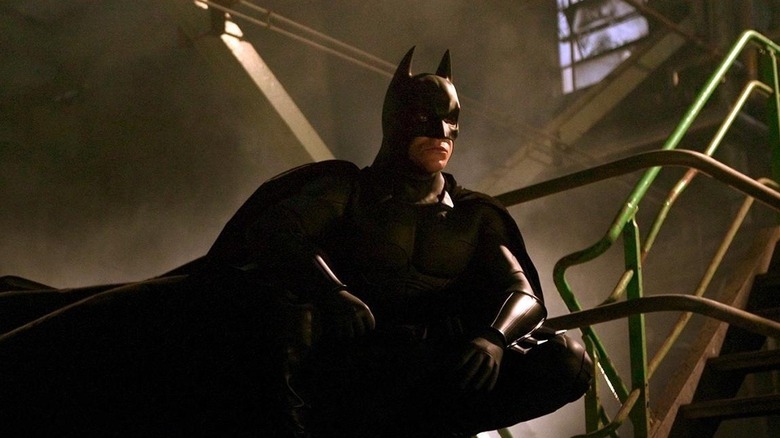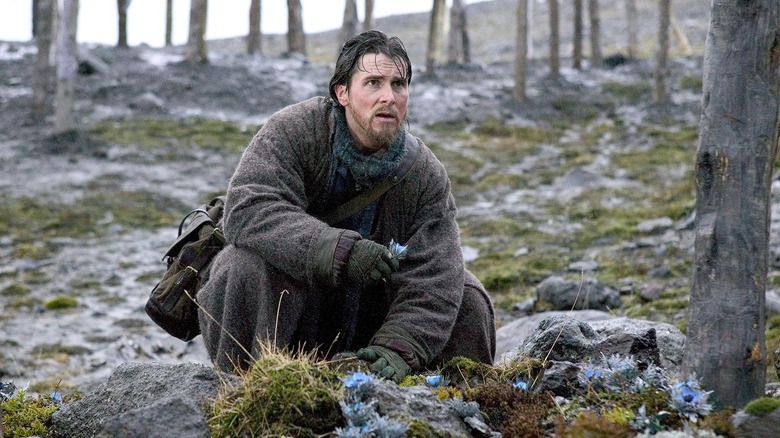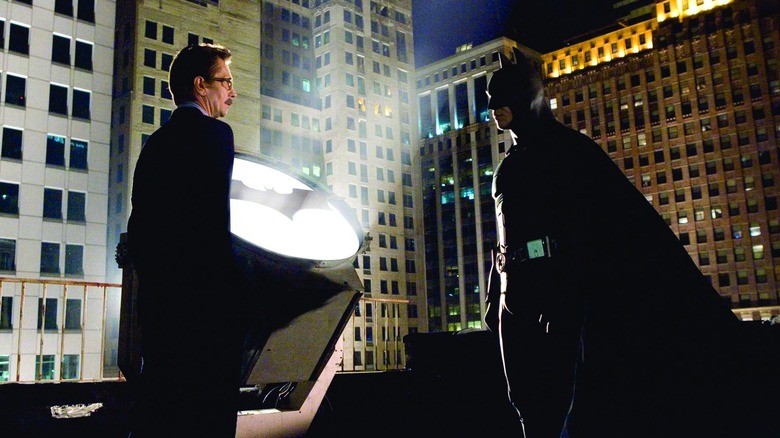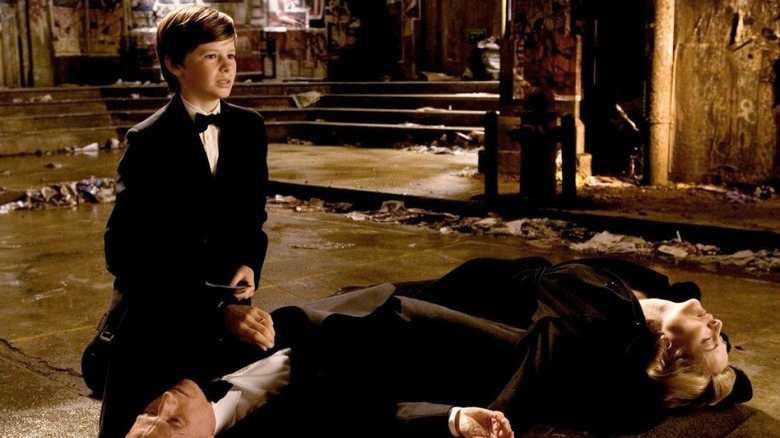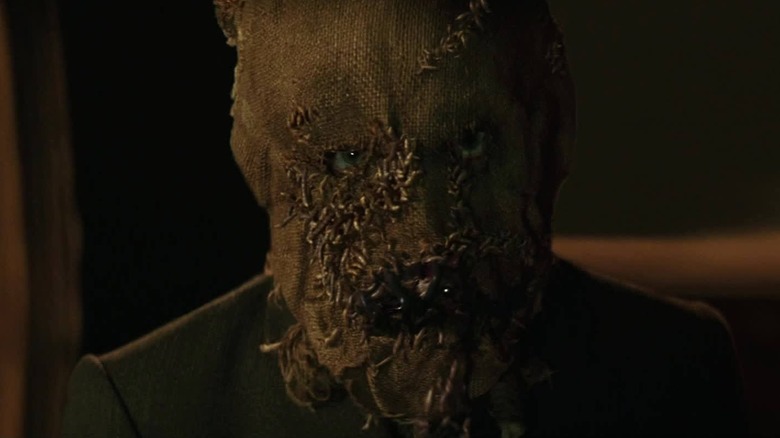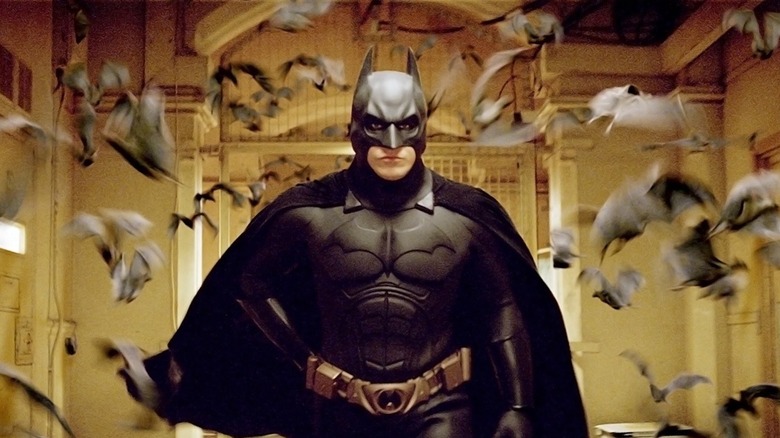Christopher Nolan's Bold Batman Reboot Began With A Box Office Disappointment
(Welcome to Tales from the Box Office, our column that examines box office miracles, disasters, and everything in between, as well as what we can learn from them.)
"He is the most credible and realistic of the superheroes, and has the most complex human psychology. His superhero qualities come from within. He's not a magical character." Those are the words of Christopher Nolan (via Variety) speaking when he was announced by Warner Bros. as the director of the then-mysterious "Batman" reboot, which we would come to know as "Batman Begins."
Those words may seem trite now, but it's also easy to forget that when Nolan made that statement in 2003, we were just six years removed from Joel Schumacher's much-maligned "Batman & Robin," with George Clooney's Bruce Wayne, the pun-heavy Mr. Freeze, and yes, the Bat-nipples. So the idea of a director thinking about the legendary DC Comics superhero in realistic terms was, at the time, novel.
The resulting film, along with the likes of Sam Raimi's "Spider-Man" in 2002, was a pivotal entry in the 2000s superhero movie boom that helped ensure the genre would endure beyond a "here today, gone tomorrow" fad. The key difference? Nolan's first entry in what would become his "Dark Knight" trilogy was actually a bit of a box office disappointment at the time of its release.
In this week's Tales from the Box Office, we're looking back at "Batman Begins" in honor of its 20th anniversary. We'll go over how it came to be, how it rehabilitated the character's public image, what happened when the movie hit theaters, how it helped pave the way for a decade's worth of gritty reboots, and what lessons we can learn from it all these years later. Let's dig in, shall we?
The movie: Batman Begins
The film centers on Bruce Wayne (Christian Bale), who travels to the East in search of a ninja cult leader known as Ra's Al-Ghul to learn the ways of the League of Shadows. Returning to Gotham City, which is overrun by crime, he discovers a cave under his mansion, leading him to adopt the persona of Batman, where he dons a prototype armored suit and attempts to clean up the city's streets before bigger threats emerge. (Namely, Scarecrow.)
Despite the disappointment of "Batman & Robin," WB had still been trying to keep the franchise alive in the ensuing years, with an exceedingly dark version of "Batman vs. Superman" starring Colin Farrell as Batman and Jude Law as Superman nearly getting made in the early 2000s. The studio knew they had to go in another direction, with movies like "Blade" and "X-Men" proving that there was a viable path forward.
Perhaps it's not surprising that David S. Goyer, who wrote "Blade" and helped make it a hit, was hired to write "Batman Begins" alongside Nolan. Goyer and Nolan truly took things back to the beginning, true to the title. Speaking with Variety in 2004, Goyer explained that they were very conscious of moving away from the cartoonish version of Batman that had emerged on film under Schumacher's direction:
"As the Batman films progressed, they became increasingly more cartoonish and more like the campy TV show. We think the audience is tired of that, and it's at odds with the way Batman is depicted in the comic books over the last decade. Batman is a classic figure whose story is wrapped in tragedy."
Christopher Nolan's Batman Begins was all about making a human hero
"Batman is the most interesting superhero because he doesn't have any superpowers," Nolan added in that '04 Variety piece. "He is very human." From showcasing Bruce Wayne's origin story in which his parents are murdered right in front of him to demonstrating how he actually became Batman, Nolan and Goyer were true to the movie's premise. They also did their research.
"Before they sat down with us, they had already done a tremendous amount of homework," Paul Levitz, then-publisher of DC Comics said in that same Variety piece. "We haven't been dealing with questions like, 'Is it 'Bruce Wayne' or could it be 'Bob Wayne' instead?'"
Nolan assembled a very impressive cast for his grounded, human-focused take on the Caped Crusader. He convinced Michael Caine ("Hannah and Her Sisters") to play Alfred, with Gary Oldman ("Air Force One"), Liam Neeson ("Schindler's List"), Cillian Murphy ("28 Days Later"), Morgan Freeman ("The Shawshank Redemption"), and Katie Holmes ("Dawson's Creek") on board in key roles. In choosing his Batman, Nolan turned to Christian Bale, who was coming off of an acclaimed role in "The Machinist." The only problem? Bale had slimmed down mightily for that role.
"He did call me and say, 'Well, you know, how do you look right now? You know? How am I going to seriously be able to suggest to Warner Bros. that you could play Batman ever if you're that skinny?'" Bale explained in a featurette produced for "Batman Begins." So, Bale bulked up — perhaps too much, getting up to nearly 220 pounds.
"I just listened to what he said about, 'Get as big as you possibly can,' so that's what I did," Bale indeed. "I could see the look on Chris' face, you know? He looked to me and it was like, 'Oh Christ, what has this guy done?'"
The film's financial journey
From the first poster to the teaser trailer, it was crystal clear that what Nolan cooked up wasn't your slightly older brother's Batman. This was a Batman hewing far closer to the darker version readers would know from Frank Miller's "The Dark Knight Returns" or "Batman: Year One." Critics were also very much on the movie's side. "The earlier Batman movies were charades," Jack Matthews wrote for The New York Daily News at the time. "With Bale, it's a biopic, filled with nuance, emotion and contradictions."
Warner Bros. released "Batman Begins" in theaters on the weekend of June 17, 2005, right in the heart of the summer movie season. It opened to $48.7 million, easily topping the charts in its debut. That was good-not-great, failing to eclipse the opening of "Batman Forever" ($52.7 million) but clearing "Batman & Robin" ($42.8 million). Even more telling? Marvel's "Fantastic Four" opened to $56 million less than a month later. Against a hulking $150 million budget, Nolan's reinvention of the character still had a long way to go.
"Batman Begins" finished its original run with $205.3 million domestically combined with a surprisingly small $168.1 million internationally, for a grand total of $373.4 million worldwide. It wasn't even the highest-grossing "Batman" movie up to that point, with Tim Burton's "Batman" making just over $400 million in its day against a much smaller $35 million budget.
Batman Begins was truly just the beginning
On paper, the movie wasn't a big success. It made less than 2.5 times its budget, and when factoring in marketing expenses, there's no way it profited from its theatrical release alone. But this was a much better era for DVD, and positive word of mouth helped give the movie a strong second life. As a result, this was truly just the beginning of Nolan's bold reinvention of Batman.
In 2008, Nolan returned for a sequel in the form of the pop culture phenomenon "The Dark Knight," which became a $1 billion box office smash, just one of a handful of movies to ever reach that milestone at the time of its release. It was crystal clear word had gotten out that Batman movies were good again. It cemented Nolan as one of Hollywood's unquestioned A-list directors, which was proven yet again when "The Dark Knight Rises" became a $1.1 billion smash in 2012 despite not being as well-liked critically as its predecessor.
None of that would have been possible without Warner Bros. taking a big swing and trusting Nolan, who had only made smaller hits like "Memento" and "Insomnia" up to that point, with such a treasured piece of IP. Movies like 2003's "X2" X-Men United" had done the dark and gritty thing before with success, but because this was within the scope of arguably the most beloved, enduring superhero in history, its impact was even greater.
The dark and gritty reboot boom that followed
More than just creating a multi-billion dollar trilogy for Warner Bros. and DC, what Nolan did with this movie and, ultimately, "The Dark Knight," did not go unnoticed by the industry. Hollywood decided to follow in Nolan's footsteps and go dark and gritty with many, many franchises in the years that followed.
In 2006, "Casino Royale" gave us a dark and gritty James Bond with thrilling results. In 2012, "Skyfall" became the only "Bond" movie to ever make $1 billion, feeling almost like a direct response to "The Dark Knight." That's just one example, of which there are many; even Tim Burton's 2010 "Alice in Wonderland," another $1 billion hit, felt in some ways like it was building off of this same mindset.
Hollywood became obsessed with infusing characters with a sense of realism, and it often worked very well. Audiences frequently ate it up. But it also often failed miserably, with 2015's "Fantastic Four," from director Josh Trank, serving as one of the premiere examples of this dark and gritty approach going awry. Even Zack Snyder's "Man of Steel," which kicked off DC's own cinematic universe in 2013, was very much building on what Nolan had done. (So much so that Nolan himself was a producer on that film.)
For better and for worse, Christopher Nolan's DNA was all over Hollywood blockbusters for the next decade and change. That all goes back to a movie that was, surprisingly enough, by no means a hit upon release. It wasn't a flop, but given the movie's legacy, one might be surprised to discover how little money "Batman Begins" actually made, relatively speaking.
The lessons contained within
Looking back, it's easy to take "Batman Begins" for granted. It's an origin story, and for many, Batman's origin story is one we've seen too many times. But we never saw it quite like this. So much of what Nolan did feels obvious now, but at the time, it seemed revelatory. That only further allowed the director to cut loose with "The Dark Knight," which is, without hyperbole, one of the most roundly beloved blockbusters ever made.
Credit where credit is due: Warner Bros. could have looked at the box office alone for "Batman Begins" and done something else. Yet, they doubled down on Nolan, realizing 20 years ago that they had only begun to tap into the potential he unlocked. Now? Nolan is one of the few filmmakers working today who can be both an auteur and a populist favorite. "Oppenheimer" won Best Picture and made nearly $1 billion. That's a rare combo.
As the superhero genre is at something of a turning point and looking for a new identity, it's worth looking back at "Batman Begins." Studios would do well to let more filmmakers do something bold with these characters. Is it risky? Sure. Does it always pay off? Of course not. "Birds of Prey" is a fine example of a good, bold movie that didn't pan out at the box office. But being risk-averse is a recipe for diminishing returns, so we'd love to see studios take bigger swings.
